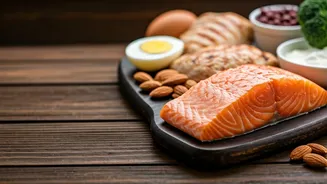Protein's Crucial Role
Protein plays a critical role in the human body, particularly for women over 35. As we age, our bodies naturally lose muscle mass, a process known as sarcopenia.
Adequate protein intake is essential to counteract this loss. It acts as the building block for muscles, aiding in repair and growth. Furthermore, protein contributes to satiety, helping manage weight by reducing overall calorie intake. It also supports bone health, critical for preventing osteoporosis, and boosts metabolism, which is often slower with age. Making protein a priority in the diet empowers women to maintain strength, mobility, and overall well-being. By understanding the importance of protein, women can proactively address age-related changes and enhance their quality of life. The benefits are numerous, including improved energy levels and a more robust immune system.
Lean Meat Choices
Lean meats are a powerhouse of protein and vital for women seeking to build muscle. Chicken breast is an excellent source, offering a high protein content with minimal fat, making it ideal for muscle recovery. Turkey breast is another lean option, providing similar benefits. For those who enjoy red meat, lean cuts of beef such as sirloin or tenderloin, when consumed in moderation, can contribute significantly. These meats are not only rich in protein but also offer essential nutrients like iron, which is critical for women's health. Iron helps transport oxygen throughout the body, supporting energy levels and overall vitality. Incorporating these meats into meals provides a strong base for muscle development and maintenance. Grilling, baking, or poaching are healthier cooking methods to ensure the protein content is preserved and unnecessary fats are avoided. Aim to include at least one serving of lean meat in your daily diet to help facilitate muscle growth and enhance overall fitness.
Seafood for Strength
Seafood provides exceptional protein alongside omega-3 fatty acids, which are beneficial for overall health. Salmon is a top choice due to its high protein and omega-3 content, aiding in muscle recovery and reducing inflammation. Tuna, especially varieties like albacore, is another excellent protein source. Moreover, it is easy to prepare and can be added to salads or enjoyed on its own. Shellfish such as shrimp and prawns are lean and high in protein, providing versatility in meal planning. These seafood options offer a wide array of nutrients, including vitamin D, essential for bone health, and iodine, vital for thyroid function. Regularly consuming seafood contributes to muscle development and supports cognitive function. It's recommended to include seafood in your diet at least twice a week to maximize its health benefits. Choosing sustainably sourced seafood is also important to ensure environmental responsibility.
Plant-Based Protein Power
For women seeking plant-based protein sources, numerous options exist to support muscle building. Lentils are a nutritional powerhouse, packed with protein and fiber, making them a filling and healthy choice. Chickpeas are versatile and can be used in salads, stews, or as a snack, providing a good source of protein and other essential nutrients. Tofu and tempeh, derived from soybeans, are complete proteins, meaning they contain all nine essential amino acids. Edamame, young soybeans, are also a fantastic option, offering a substantial amount of protein per serving. Quinoa is another complete protein source that is easy to prepare and incorporate into meals. Combining different plant-based protein sources can ensure a comprehensive intake of amino acids. These plant-based choices are often low in saturated fat and high in fiber, contributing to heart health and overall well-being. Incorporating a variety of plant-based protein sources into your diet is a sustainable way to build muscle and support a healthy lifestyle.
Dairy Delights for Muscle
Dairy products offer a readily available source of protein that aids in muscle development and recovery. Greek yogurt is an excellent choice, providing a high protein content and beneficial probiotics. Cottage cheese is another fantastic option, often containing a substantial amount of protein per serving. Milk, particularly cow's milk, is a complete protein source, also providing essential nutrients like calcium and vitamin D. Whey protein, derived from milk, is a popular supplement that can be easily added to smoothies or shakes to boost protein intake. Casein protein, another milk protein, digests slowly, offering a sustained release of amino acids, which is beneficial before sleep. These dairy options support muscle repair and growth, providing essential nutrients for overall health. Choosing low-fat or non-fat dairy products can help manage calorie intake. Integrating dairy products into your daily diet ensures adequate protein intake, facilitating muscle building and supporting overall fitness goals.















